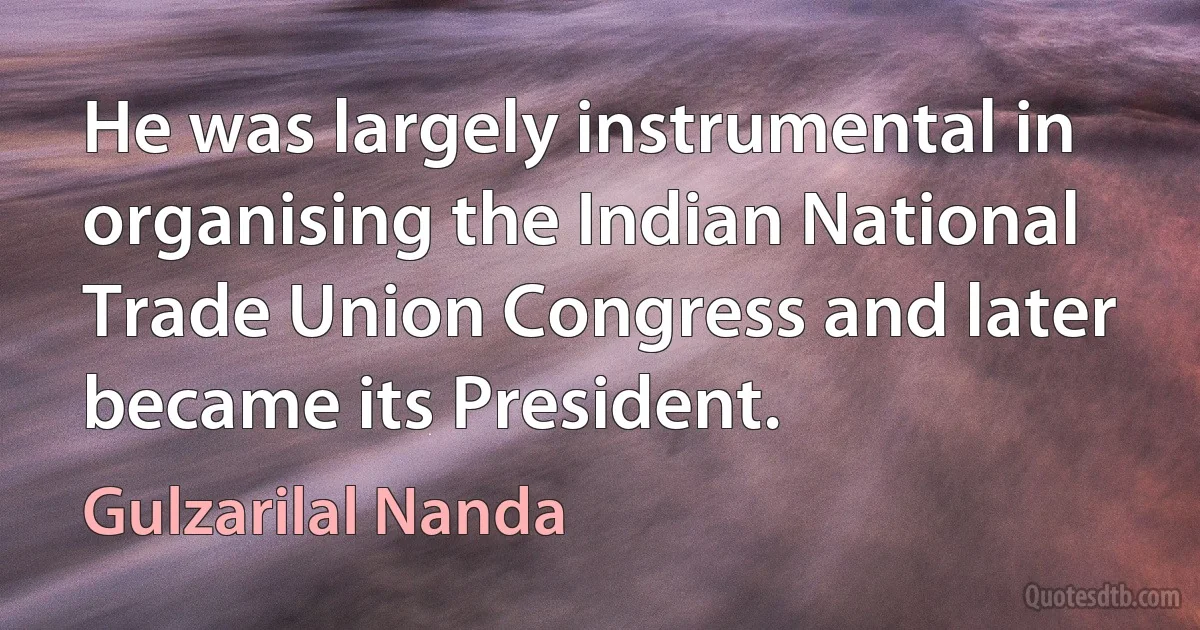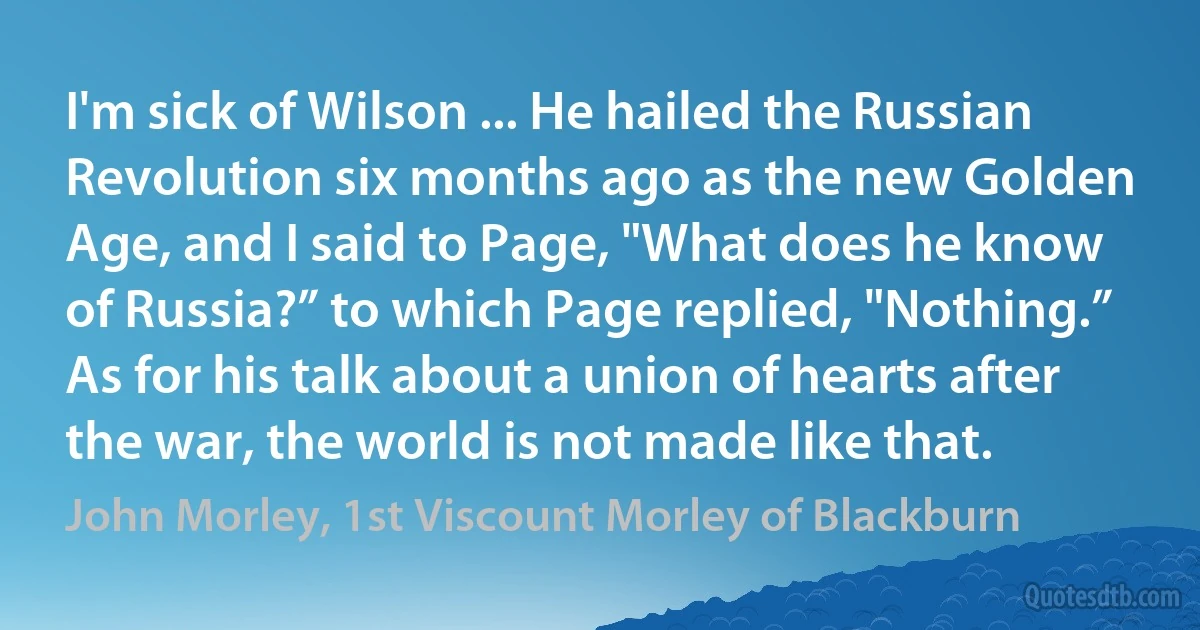Union Quotes - page 65
Now it is up to all of us, all the participants in the European process, to make the best possible use of the groundwork laid down through our common efforts. Our idea of a common European home serves the same purpose too. It was born out of our realization of new realities, of our realization of the fact that the linear continuation of the path, along which inter-European relations have developed until the last quarter of the twentieth century, is no longer consonant with these realities. The idea is linked with our domestic economic and political perestroika which called for new relations above all in that part of the world to which we, the Soviet Union, belong, and with which we have been tied most closely over the centuries.

Mikhail Gorbachev
I began my book about perestroika and the new thinking with the following words: "We want to be understood". After a while I felt that it was already happening. But now I would like once again to repeat those words here, from this world rostrum. Because to understand us really - to understand so as to believe us - proved to be not at all easy, owing to the immensity of the changes under way in our country. Their magnitude and character are such as to require in-depth analysis. Applying conventional wisdom to perestroika is unproductive. It is also futile and dangerous to set conditions, to say: We'll understand and believe you, as soon as you, the Soviet Union, come completely to resemble "us", the West.
No one is in a position to describe in detail what perestroika will finally produce. But it would certainly be a self-delusion to expect that perestroika will produce "a copy" of anything.

Mikhail Gorbachev
The Baltic republics, because of their history and other characteristics, could enjoy special status in the Union. However, the 'sovereignization' of Russia scuttled the search for a new formula for relations with the Baltic republics in a reformed Union. It caused a chain reaction, during which analogous enactments were passed by all of the Union republics and later autonomous republics. A 'parade of sovereignties' had begun. The only means of preventing the collapse of the Union was the preparation without delay of a new Union Treaty.

Mikhail Gorbachev
Weirdly, the world suddenly feels bipolar. All over again the west confronts an irrationalist, agonistic, theocratic/ideocratic system which is essentially and unappeasably opposed to its existence. The old enemy was a superpower; the new enemy isn't even a state. In the end, the USSR was broken by its own contradictions and abnormalities, forced to realise, in Martin Malia's words, that "there is no such thing as socialism, and the Soviet Union built it". Then, too, socialism was a modernist, indeed a futurist, experiment, whereas militant fundamentalism is convulsed in a late-medieval phase of its evolution. We would have to sit through a renaissance and a reformation, and then await an enlightenment. And we're not going to do that.

Martin Amis
What Stalin wanted in Europe above all, as we have seen, was security. But he was also interested in the economic benefits to be had from his victories in the West. The little states of central Europe, from Poland to Bulgaria, had lived under the shadow of German dominion long before World War Two: in the 1930s especially, Nazi Germany was their main trading partner and source of foreign capital. During the war this relationship had been simplified into one of master and slave, with Germany extracting for its war effort the maximum possible output from land and people. What happened after 1945 was that the Soviet Union took over, quite literally, where the Germans had left off, attaching eastern Europe to its own economy as a resource to be exploited at will.

Tony Judt
Where are you from?” Sophia asked.
Larry looked a bit startled. "I'm from here...Great-greats came over from Holland."
"You said ‘y'all.'"
Larry was confused....
"What was that about?" Anne-Solenne asked.
"It's totally a Southern way of talking. Iowa is a Northern state. Fought on the Union side in the Civil War. Never had slavery...Northerners don't talk like that, they don't drawl, they don't say ‘y'all'...”
"Or put the Stars and Bars on their bumpers,” said Julian...and pointed at a Confederate flag sticker on the back of Tom and Kevin's truck.
"Point being, it was not like that to my uncle...When he was born, the Civil War was only ninety years in the past-almost within living memory. It would have seemed weird for Northerners to paste the traitors' flag on their bumper or cop an accent from Alabama. But while he was alive-”
"The cultural border shifted north.

Neal Stephenson
Joe Hume talked to me very earnestly about the necessity of an union of Liberals. He said much about Ballot and the Franchise. I told him that I could easily come to some compromise with him and his friends on these matters, but that there were other questions about which I feared that there was an irreconcileable difference, particularly the vital question of national defence. He seemed quite confounded, and had absolutely nothing to say. I am fully determined to make them eat their words on that point, or to have no political connection with them.

Thomas Babington Macaulay
I say to Ireland what the Liberals or the Republicans of the North said to the Southern States of America-The union must be preserved. You cannot and shall not destroy it. Within these limits there is nothing which you may not ask and hope to obtain-equal laws, equal justice, equal opportunities, equal prosperity.

Joseph Chamberlain
So this is it, the final chapter, the end of the road. A 47-year political experiment that the British frankly have never been very happy with. My mother and father signed up to a common market, not to a political union, flags, anthems, presidents, and now you even want your own army. For me, it has been 27 years of campaigning and over 20 years here in this parliament. I'm not particularly happy with the agreement we're being asked to vote on tonight. But Boris has been remarkably bold in the last few months... he's promised us there will be no level playing field, and on that basis, I wish him every success in the next round of negotiations, I really do.

Nigel Farage
They should remember that if wages were not so good as they should be, if the hours were long, and if the conditions of labour were becoming worse, the responsibility rested with those men who would not come inside the union and try to make things better. What was it that kept them apart? Some people said it was because...men held different religious opinions they would not work together in the union. Nothing, in his opinion, could be more stupid. What did it matter to a man whether his neighbour was a Protestant or a Catholic so long as they were working men and had one common interest, to work together for each other's good?

Keir Hardie
I believe that we have to negotiate a better solution that works better for Britain if we are going to stay in and play a part in the European Union in the future, but let me be absolutely clear: I think it is defeatist to sort of say we want to leave the European Union. We should say no, this is a club that we are members of, and before we talk about leaving it, first of all we're going to try and change the rules and change the way it works and change the objectives that it has in order to make it something that works for Britain.

Philip Hammond
[W]e are talking about economic and political union. We are posing a question about political entity, about nationhood-the thing for which men, if necessary, fight and, if necessary, die, and to preserve which men think no sacrifice too great. In respect of our nationhood, then, I say that we are not a part of the continent of Europe. The whole development and nature of our national identity and consciousness has been not merely separate from that of the countries of the Continent of Europe but actually antithetical; and, with the centuries, so far from growing together, our institutions and outlook have rather grown apart from those of our neighbours on the continent. In our history, both recent and earlier, the principal events which have placed their stamp upon our consciousness of who we are, were the very moments in which we have been alone, confronting a Europe which was lost or hostile. That is the picture, that is the folk memory, by which our nation has been formed.

Enoch Powell
Enoch was right. He had made the two intellectual leaps in economic policy which Keith Joseph and I would only make some years later. First, he had grasped that it was not the unions which caused inflation by pushing up wages, but rather the Government which did so by increasing the supply of money in the economy. Consequently, incomes policies...were a supreme irrelevance to anti-inflation policy. The only aspect of the matter which Enoch then and later failed sufficiently to grasp was the importance of the indirect link between trade union power and inflation. This lay in the fact that over-powerful trade unions priced their own members out of jobs, and inflicted unemployment on both union and non-union workers alike. Governments...would then react by lowering interest rates and expanding the money supply. This would increase demand and jobs for a time, but it also increased inflation... That said, Enoch's insight into the cause of inflation was of supreme importance.

Enoch Powell
When the news of the Russian Bolshevik Revolution of November 1917 burst upon the world, American workers learned for the first time of a man named Vladimir Lenin-through this great event in human history, the beginning of socialism. We also learned some new words, which became part of the language in no time, "Bolshevik" and "Soviet," among them. Even those of us who were left-Socialists and IWWs knew practically nothing of the Russian Socialist movement, except that we had great sympathy with its long, agonizing struggle to overthrow the tsar's cruel and bloody regime. Overnight, "Bolshevik" became a household word, even to those who did not know it merely meant "majority," and referred to a political division in the Russian Social-Democratic Labor Party. "I am a Bolshevik from the crown of my head to the tip of my toes!" said Debs. "Damned Bolsheviks!" employers shouted at militant workers and union organizers. All strikers were "Bolsheviks," of course.

Eugene V. Debs
In 1979, with changing technology, I wrote and produced a video on the life and times of Eugene Victor Debs that was sold to colleges around the country. Debs was a great American who played an enormously important role in our history, but he was unknown to most people. He was one of the leading trade union leaders of the late nineteenth century, the founder of the American Socialist Party, and a six-time candidate for president of the United States. In 1920, he received nearly 1 million votes for president while he was in jail for his opposition to World War I. Many of the ideas that Debs campaigned on were later adopted by FDR and incorporated into the New Deal. Today, I have a plaque of Debs on a wall in my Senate office.

Eugene V. Debs
Without a doubt, President Yeltsin - with all the human weaknesses no one is free of - was one of the truly great men of our age. When all was uncertain in the disintegrating Soviet Union, he was the one to set a new course by abolishing the Soviet Union and recognising the independence of the three Baltic States. His repudiation of Communism was unequivocal, and he clearly directed the new Russia towards ever closer cooperation with the rest of Europe. He was a great person in the history of Russia and of Europe.

Boris Yeltsin



